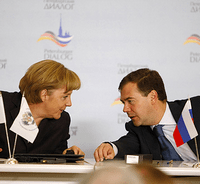Coming on the heels of Berlin's decision to phase out nuclear power, the recently signed memorandum of understanding between German utility RWE and Russia's state-owned Gazprom to negotiate a joint venture on downstream gas and power plants could spell bad news for Europe on three levels. First, if it bears fruit, the partnership will undermine European diversification efforts, since RWE was the leading utility behind the European Union's Nabucco pipeline designed to tap new Central Asian supplies. Second, it will bolster oil-indexed pricing schemes against the impact of wholesale spot prices, serving to keep prices on an "artificial" footing. Third, once Gazprom seriously enters the German downstream scene, it will in all likelihood rapidly access other European markets. As a result, Europe's dream of unbundling production, transit and distribution of gas will be dead. Instead, Europe will be tied to Russia's hip, at a time when Moscow is increasingly looking toward Asia for lucrative new markets.
The development comes amid an economic crisis that has otherwise largely spared EU energy policy. Capacity margins are high and prices cheap. But it would be wrong to conclude that Europe has nothing to worry about on energy. Weak fundamentals have masked deep policy flaws. If anything, the storm clouds are gathering fast, and nowhere more so than on gas, the mainstay of Europe's efforts to reduce carbon emissions by scrubbing out coal. Europe has ignored developments in Asia, where fundamentals will continue to tighten, specifically in relation to Russian supplies, threatening to make European structural dependence on Russia the way of the future. The continued instability in North Africa has also made alternative upstream supplies a tougher nut to crack.
However, the real challenges lie within the EU itself, most notably in Germany. If the RWE-Gazprom MoU is any indication, Berlin's knee-jerk post-Fukushima nuclear phase-out will likely give Russia a far greater downstream European stake. Moscow expects to pump a record 158 billion cubic meters of gas to Europe this year, and its hand will be even stronger if other European states continue the move away from both nuclear energy and newfound shale gas reservoirs. That could mean a further 20 bcm of Russian gas per year for Germany alone. Berlin, not Brussels, is clearly dictating European "energy policy" today.

